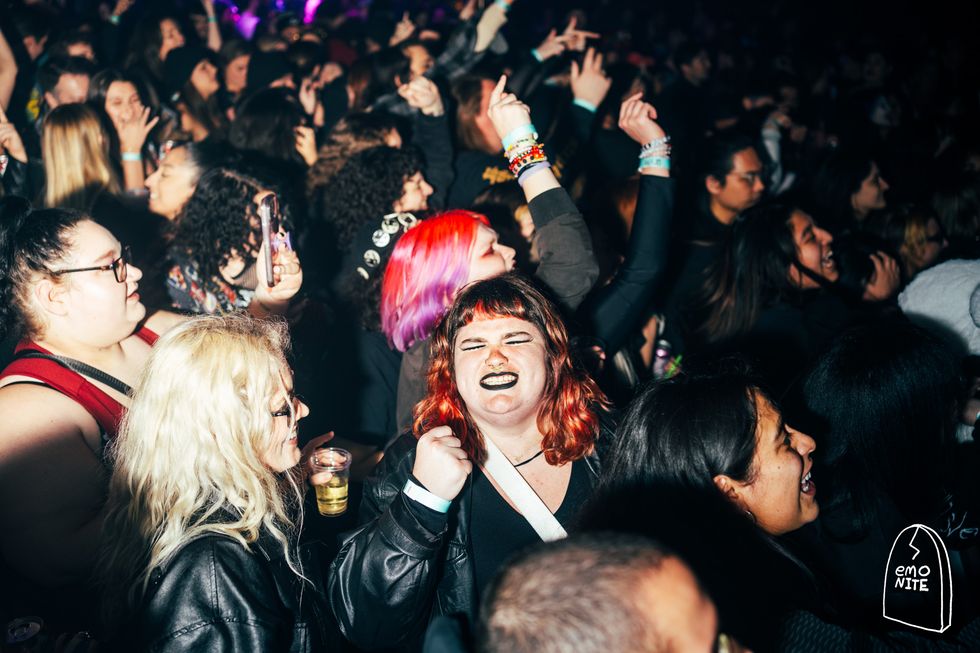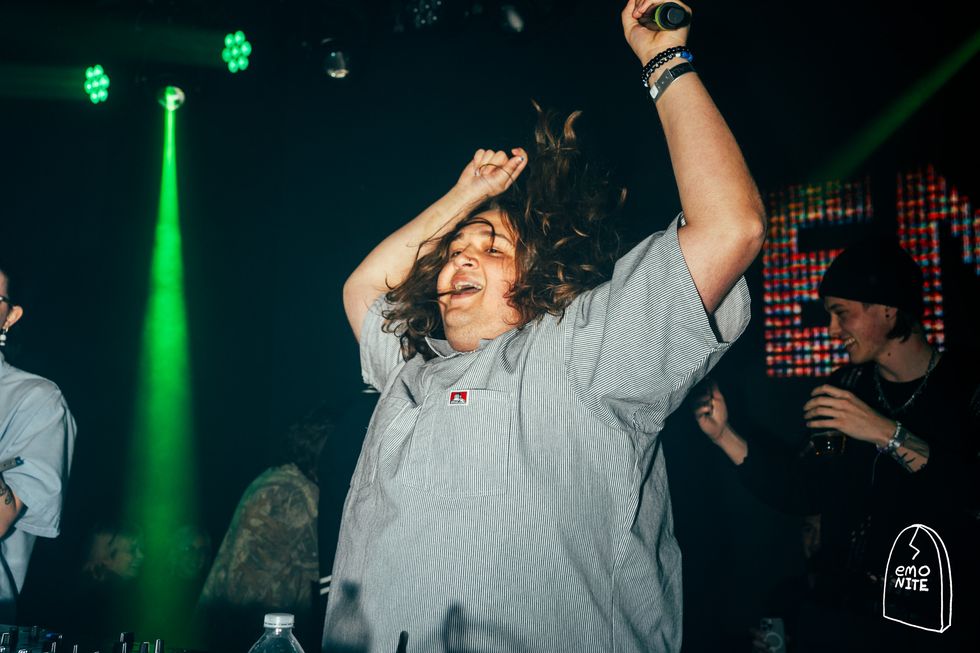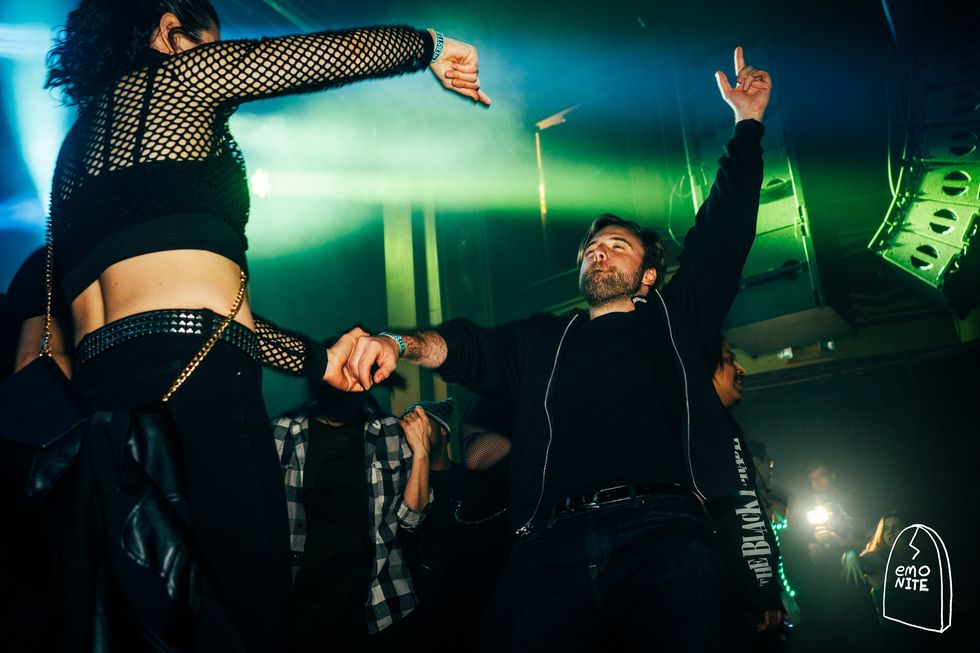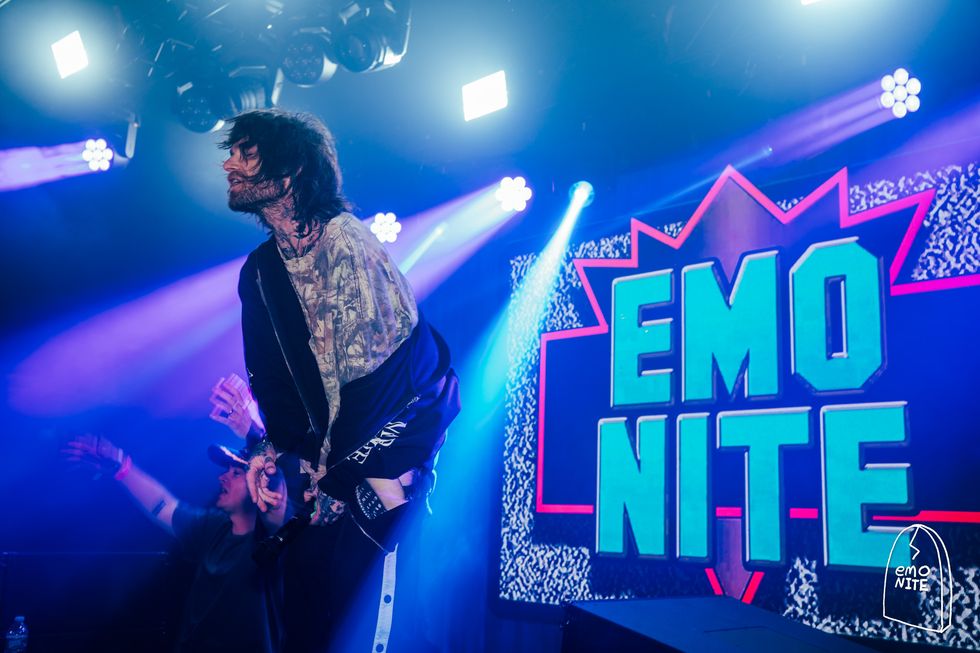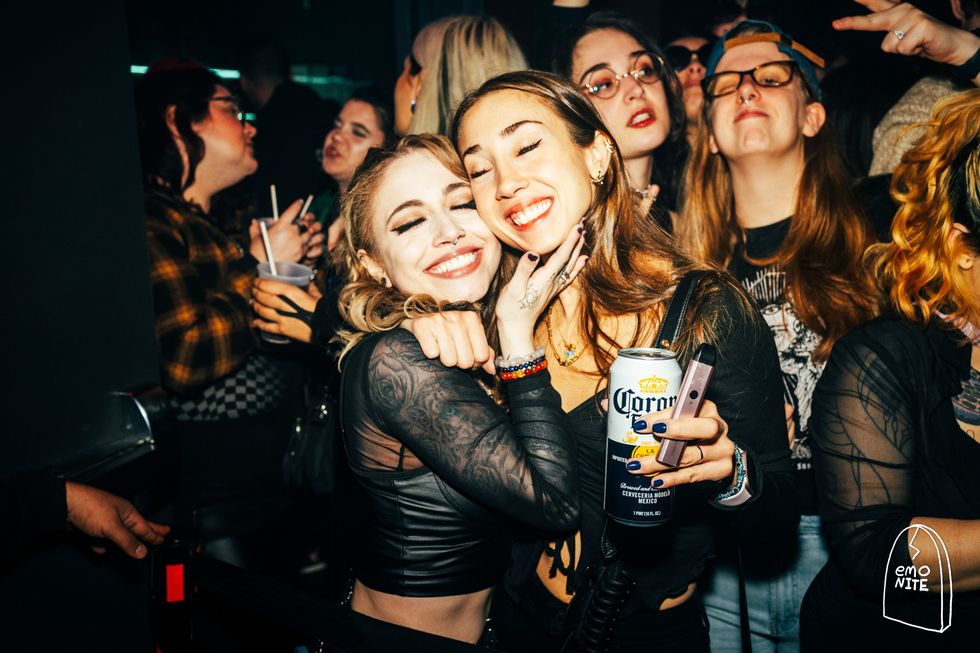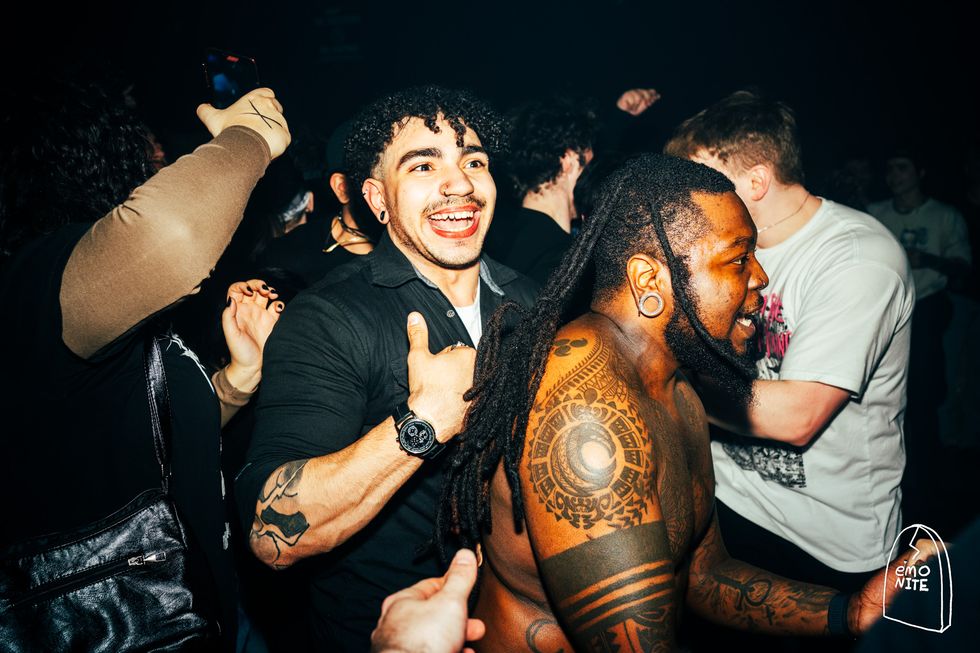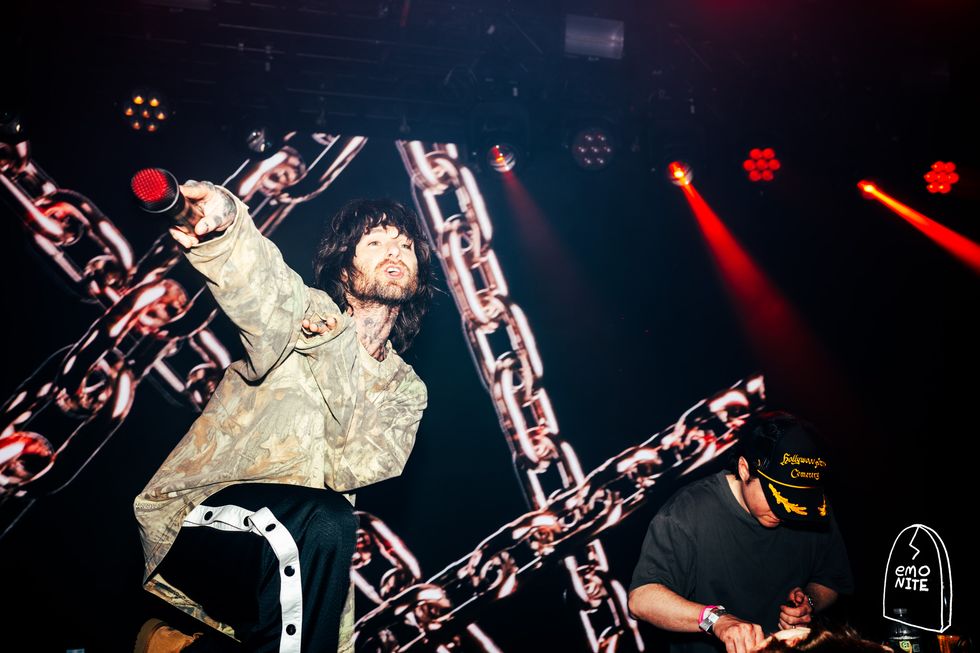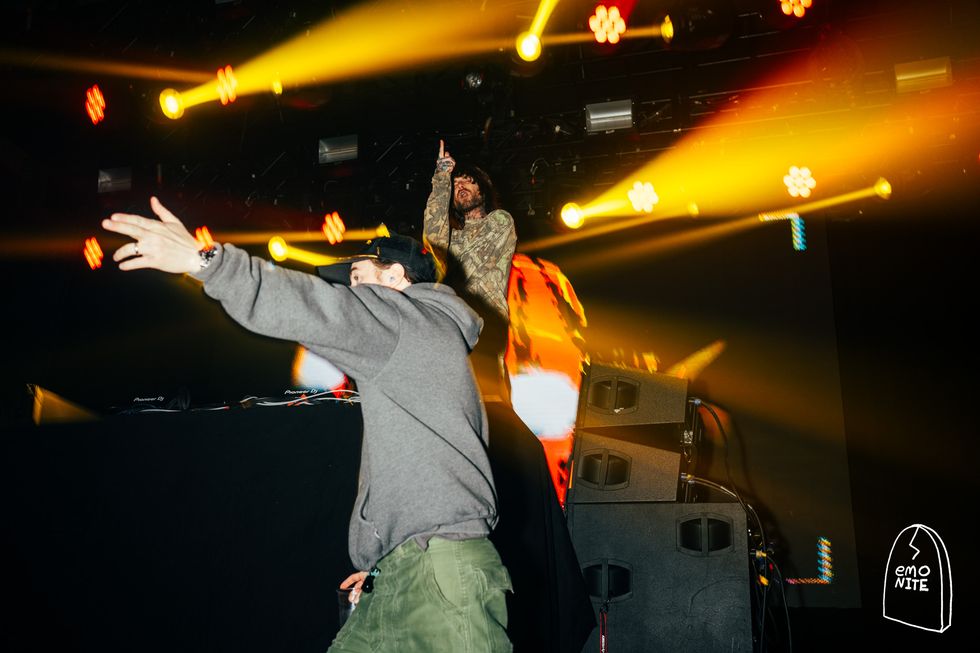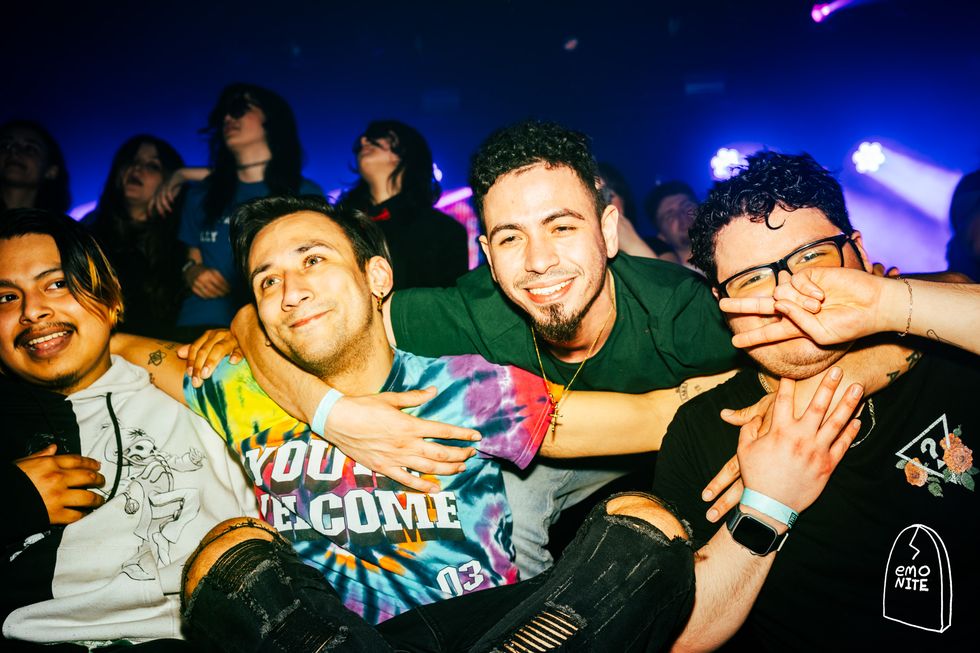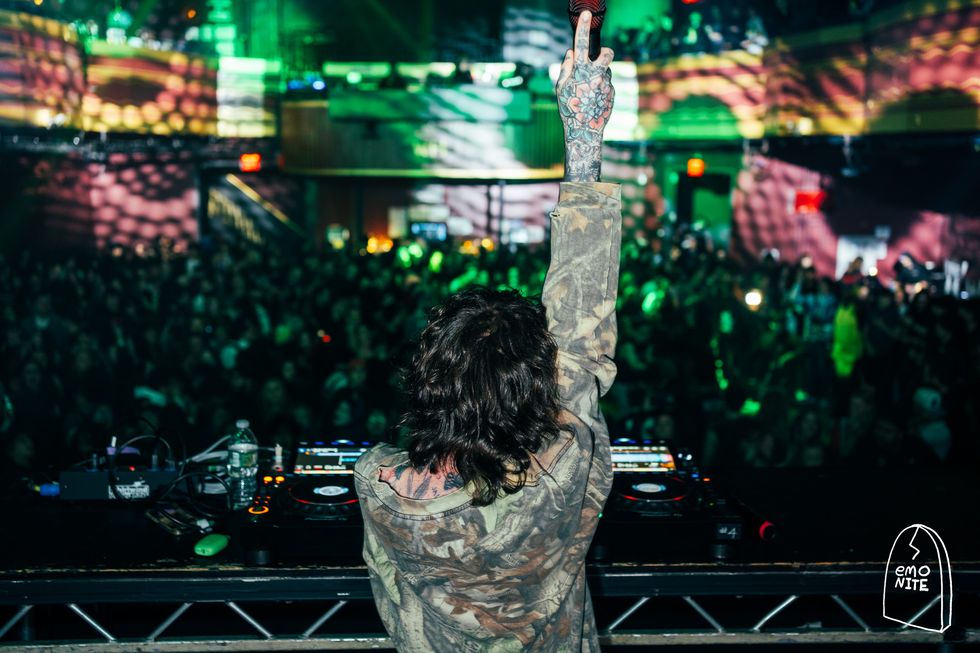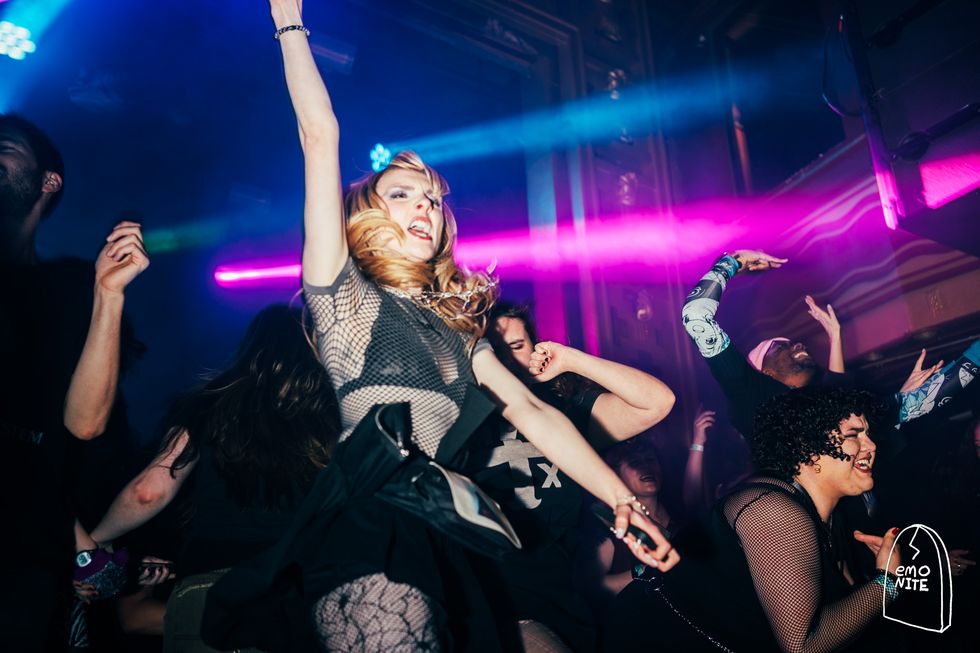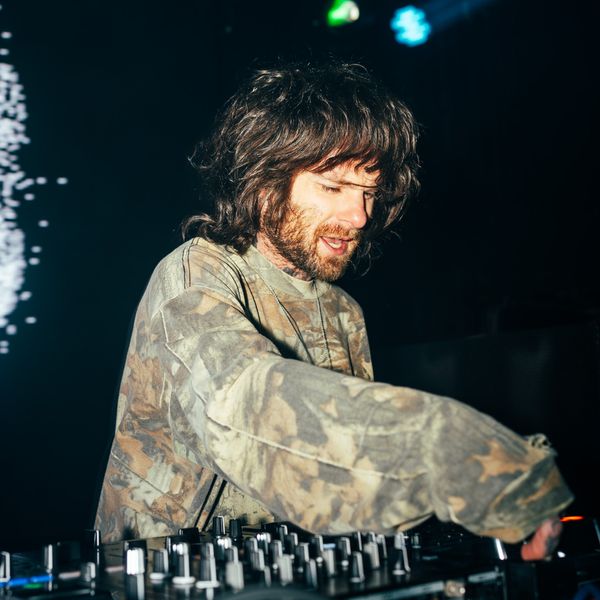
Emo Nite Time Travels in the East Village
By Joan Summers
Mar 27, 2024It’s 2008, and well past my bedtime in Truck Stop, California. I’ve just finished loading up music equipment with the roadie from the group my friend’s band was on tour with. Their lead singer had just finished berating me for how I rolled the wires, the pink raccoon tails in his overly long hair swaying to and fro. I remember the taste of the stale Taco Bell quesadilla after a late show, the itchiness of the camper van’s carpet pressed into my face while I napped, the vibration of my LG EnV as I got texts from the boy I liked, probably about the latest Hellogoodbye song.
It was yesterday and also a million years ago, as memories flood me from the sidelines at Emo Nite in the East Village. Webster Hall is packed, and attendees have climbed onstage to head-bang and scream and lead the crowd’s catharsis. The party's founders, TJ Petracca and Morgan Freed, bounce around the DJ booth like teenagers again, joy and excitement written plainly across their faces. I feel myself grinning, teen emotions bubbling up inside my chest for the first time in ostensibly a decade.
Such is the power of Emo Nite, which I’d not yet borne witness to when I sat down with TJ and Morgan at a hotel bar just hours prior. The first bash of their burgeoning party empire was held in an East LA dive bar 2014, with only an iPad, an AUX cord and a dream. Over the next ten years, though, their humble party would span cities across the country, even making its way to the Sahara tent at Coachella. Alongside their ascent is a resurgence in the music and culture one could previously find lining the walls of their local Hot Topic in the 2000s.
Back to the East Village, 2024. My own vintage Hot Topic band tees are packed away somewhere at the moment, so I settled for a black Gaultier sheath — emo enough, but I wound my way through the hotel lobby with Morgan feeling like I’d slightly lost my California cool girl credentials just a bit. Almost immediately, though, the two launch into casual conversation with me like fast friends, and it quickly becomes apparent that they host the most talked about party of the last two years for a reason.
Read PAPER’s full conversation with TJ Petracca and Morgan Freed below.
You met at an office job, but I couldn't find what kind of office job you met at!
TJ: It’s cool to say now, because the company doesn’t exist anymore. We worked at two separate sorts of divisions there. I did social media digital strategy, and Morgan was doing a lot more of the creative stuff, like music videos, and experiential marketing.
I feel like a lot of great partnerships of our generation started in office jobs between people who were like, maybe this isn't what I want to do with the rest of my life!
Morgan: My office was a bunch of metal guys, which I like, I like that. But… I mean, there's only so many times you can hear “Ride the Lightning.” [Laughs] I would want to listen to different shit and TJ would listen in on it. I just kept going into his office and bothering him. And that's really it.
You guys started so small, in a bar in LA with an AUX and a dream. Now you’re at parties across the country, Coachella, you just launched a record label. Does it ever feel overwhelming?
Morgan: I want to try and be in the mode and do stuff and like, shit keeps happening! It feels like we’re just trying to keep up, do our best.
TJ: We just had a conversation this morning. We’re sitting right over there, drinking our coffee, and we’re both talking about relinquishing some control, and how hard that is for us. Because, you know, we do have a good team. I think we have like, seven people in-house. But it’s still really hard. When we started the company, when we started doing this, we were wearing a lot of hats, and we still wear a lot of hats. Now it’s like, aren’t we ready to pass some of the hats to other people? How do we take them off? It’s impossible!
This is your baby! You built it, and I’d imagine it’d be hard to let go of it.
Morgan: I feel like it’s just in our nature. So it’s really hard to not want to be involved with something that we really like and care about all the time, and trust that somebody else will be loving and caring about it as much as we do. I think that’s the hardest thing for me.
When you see other people bring their own vision to it, do you feel a sense of possessiveness?
Morgan: I really do, but I think that’s what’s awesome. At least on the creative side, I want to hire somebody who I think is better than me. And has better ideas than me, because so many people are creative, and there’s so many new ideas all the time. I think expanding, and looking outside of myself, is good, but also scary!
You guys talk about the community that you have fostered around Emo Nite. How it’s open, and accepting. What about the scene do you think brings that energy to these parties? Is it the music, that long standing community that used to love it and champion it back in the day?
TJ: I think it’s because of the fact that it wasn’t cool. For so long, even at its peak, emo was never a cool thing. When I was in high school, and I found somebody else liked this music, I connected with them almost immediately. That same sort of thing is what connected the two of us. When we’re in the office job, that music that we wanted to listen to still wasn’t cool with all the metal guys. Then we became friends because of it. You find people that have been shunned, or looked down on. You connect and you’re like, they know what’s up!
I was going to say, my Warped Tour band tees and burned CDs weren't cool until after the fact.
Morgan: I mean, we’ve been doing this podcast now, CD Burners out of our office. We’re going back and taking a really deep look into these albums. We just did the Hawthorne Heights album. I was like, this is the music where your parents were like, Shit, you’re listening to this?
Speaking of your community, as you’ve grown, you’ve attracted attention and interest from people who maybe weren’t super into the music back in the day, but have a new love for it. Obviously, there’s the shadow of Vanderpump Rules hanging over this question, so I have to ask: As new people have come in, and interest in Emo Nite grown, how has that long standing community reacted, or adapted?
TJ: It’s super interesting that you bring up Vanderpump Rules, because we actually just talked about this between ourselves. Those girls are the perfect example of how open our community can be, in saying, Oh, shit, you’re the real deal. A Day to Remember’s album, Homesick, is one I wasn’t super familiar with. So, the Vanderpump Rules girls came through, and they put it on their playlist. Then, in a moment I don’t think I’ll ever forget, Ariana played "Mr. Highway’s Thinking About Revenge.”
Deep cut!
TJ: She got up on the table, and she had the cryo gun, and it got to the part in the song where it’s like, “Disrespect your surroundings!” The crowd was like, fuck yeah. It looked like these girls… initially, they probably thought: They’re reality stars, what are they doing here? They were up there, like, We’re part of this too. Everybody immediately knew that they were one of us. That was so cool. I love pop culture, and Vanderpump Rules was the biggest pop culture moment of last year.I mean, literally, you guys are tied to it forever now.
Morgan: I hadn’t ever seen the show. I didn’t understand it. But when they submitted their playlist, they fucking destroyed it.
So they made their own playlists? They were like, this is what we want to play?
TJ: For most guests, we say that we want them to put together their own playlist. They don’t have to know how to actually use the CDJS. But they put together playlists, and then we all DJ off the same USB stick. I was pleasantly surprised by the VPR girls playlist, but then again, they were coming to Emo Nite in like, 2017. Ariana was buying our merch in 2016. Like, they’re legit! They’ve been a part of the scene for a long time, and they appreciate the music.
That’s been the key, I think, to our philosophy with Emo Nite, especially starting in LA. When we first started it, we were like, it doesn’t matter what sort of creative lane everybody is in, whether they’re in hip hop, or electronic music, or working in movies, or even reality TV. I think a lot of people our age went through this moment where they were the weird fucking kid in their high school, and the creative person. Now they’re in LA doing their thing. But we all have this collective experience that shaped us and brought us here.
TJ, I know you watch the show, but Morgan, it’s so funny that you weren’t super familiar with Vanderpump Rules since they were basically going through the most visible, groundbreaking moment in their careers last summer. It fit the moment perfectly, with the rage people felt last year.
TJ: So, they did it twice last year. They did it in April, and then they did it again for the show in August, which was the one they televised. The April party was, I think, one of the first moments where Ariana came out after everything, and showed her face and did something publicly. It was a palpable catharsis, I think, for the girls. You did see it sort of play out this season, or at least they’ve talked about it. Scheana and Katie had some unresolved tension, and seeing the three of them come together and do their set, it was so great.
Morgan: They’re super nice, and I was really impressed that they were filming a reality show, because they didn’t tell them what to say. I thought that’s how reality shows were.
TJ: I think that’s why the show is so good, because it’s so authentic and real. They’ve all fully committed to putting their lives out there 150%, to the point where the most hurtful thing that could happen to Ariana, and the most embarrassing thing that could happen to Tom, the most shameful thing somebody could do, their first thought was: Call the cameras and let them in here, we’re going to get it on the show. That’s the path they’ve all taken together, and you don’t find that on a lot of reality shows.
Emo Nite being on Vanderpump Rules was not my bingo card for 2023. Broadly, though, emo music and the scene around it has broken through the mainstream culture again in a big way over the last few years. Do you guys, at any point, ever think that you helped that happen, or contributed to its resurgence in any way?
Morgan: I think about it every day!
Especially with the explosion of similar “emo nights” everywhere!
Morgan: A lot of the ones that start now, I think they’re like, I’m going to hop on a train because I can make a bunch of money, and do like, cash cow shit. We were DJing to people in sweaty bars that were waiting in lines for hours, we’re meeting every single fucking person. And all the people around us that weren’t in it were like, This shit is lame, you’re lame. All that shit! And we stuck through it because we love this. It was like, not a cool place in 2014. It was not.
TJ: It’s a bittersweet thing, I think for us, because we’re very very happy with the place the scene is at right now.
Morgan: Yeah, I like the fact that all these bands are doing shit again!
TJ: Our heroes are getting a chance to play again. They’re getting the recognition that they deserve, the paychecks that they deserve.
I mean, the scene, from what I was told back in the day, was not the most equitable for artists.
TJ: Going back to that last question for a second, I think with any of the stuff we’re seeing pop up right now, we respect anything that’s done with authenticity and care. Some of it isn’t. That’s the part that’s bittersweet. But at the same time, I think there’s a lot of good that’s happening as well.
Morgan: That’s the thing! On the flip side of that, like you said with the newer kids coming to these events. They might not have heard some of these albums that could change their lives if it wasn’t for the trajectory of Emo Nite. Finding music through any outlet you can get it? That’s how you do it. We used to steal it off Limewire, and had Napster. If a 15 year old kid can get their hands on a The Get Up Kids album, and they saw them through one of these shows… I’m just happy that it's possible, in an age where it's so easy to just listen to whatever Spotify tells you to listen to.
Something apparent as I went back through that trajectory you mentioned is that you both center the artists. It would have been so easy to have thrown a party and called it a day. But you brought these bands out, you’ve started your own label. Why was it important to include the artists so heavily in this process?
TJ: With the guest artists that we invite, I would say we don’t always announce them. That’s by design. We want people to come to the parties for each other, for the experience of the event itself. We’re also able to feature live bands, because a lot of these markets that we’re in now have two rooms where we can have a party upstairs, and then we can put on five local bands, up and coming bands, that we think are cool. That started in LA at the Echoplex, we would do the Aquaponics party. Upstairs, it was like, alright, let’s build the crowd every month, but how do we keep the scene growing? How do we keep highlighting stuff that we think is cool? In 20 years, we’ll be playing My Chemical Romance, but also Movements. Now, we play Movements on the mainstage, and we can DJ one of their songs, and the whole room will explode. Five, six years ago, Movements was playing upstairs at Emo Nite for 500 bucks. We want to be the stewards for the next wave, and keep exposing people to it and building up the scene as best as we can.
Morgan: That’s how we grew up, right? Going to shows and finding bands at shows that you really liked that you didn't know existed. So, if we have the opportunity to do more of that, we want to. As TJ said, they also have a built in audience, they don’t have to hustle as hard to get people to their shows, and they can actually gain a little bit of what it feels to be playing shows somewhere other than a living room.
Last question: You mentioned at the beginning you want to find time to step back and trust the process with other people. Is there something you’re focused on next?
TJ: We’ve been doing our podcast, which is sick as hell. We’re also learning how to DJ for real, and are graduating from DJ school in a week.
So wait, it’s an actual school?
Morgan: It’s a 10-week course!
I wasn’t sure if you were kidding about it being an actual school.
Morgan: It’s the only school I’ve ever gone to!
If I could go back in time, I would not get a liberal arts degree, I’d go to DJ school.
TJ: You still can!
Morgan: We’re also working on a couple different properties within the company, and working on building our label. The reason we named it Graveboy Records. The reason we named it that is so it’s not confined to emo, as artists who do shoegaze maybe wouldn’t want to sign to “Emo Nite Records.” We like music, and we like culture, and we want to do what’s best for both at the same time.
TJ: I think that’s always been the most rewarding and fun part of this whole journey we’ve been on, seeing the changes in culture. Not to blow Emo Nite up too much, but big pop stars are ripping off Paramore. And why is Paramore cool right now? Well, what was the coolest party in LA for the last 10 years? You know? Shaping culture like that, to me, is so interesting, but I don’t want to sound braggadocious or anything like that.
That’s the beauty of making something like Emo Nite. You get to brag a little bit.
Photography: Maxwell Brown
From Your Site Articles
Related Articles Around the Web
MORE ON PAPER
ATF Story
Madison Beer, Her Way
Photography by Davis Bates / Story by Alaska Riley
Photography by Davis Bates / Story by Alaska Riley
16 January
Entertainment
Cynthia Erivo in Full Bloom
Photography by David LaChapelle / Story by Joan Summers / Styling by Jason Bolden / Makeup by Joanna Simkim / Nails by Shea Osei
Photography by David LaChapelle / Story by Joan Summers / Styling by Jason Bolden / Makeup by Joanna Simkim / Nails by Shea Osei
01 December
Entertainment
Rami Malek Is Certifiably Unserious
Story by Joan Summers / Photography by Adam Powell
Story by Joan Summers / Photography by Adam Powell
14 November
Music
Janelle Monáe, HalloQueen
Story by Ivan Guzman / Photography by Pol Kurucz/ Styling by Alexandra Mandelkorn/ Hair by Nikki Nelms/ Makeup by Sasha Glasser/ Nails by Juan Alvear/ Set design by Krystall Schott
Story by Ivan Guzman / Photography by Pol Kurucz/ Styling by Alexandra Mandelkorn/ Hair by Nikki Nelms/ Makeup by Sasha Glasser/ Nails by Juan Alvear/ Set design by Krystall Schott
27 October
Music
You Don’t Move Cardi B
Story by Erica Campbell / Photography by Jora Frantzis / Styling by Kollin Carter/ Hair by Tokyo Stylez/ Makeup by Erika LaPearl/ Nails by Coca Nguyen/ Set design by Allegra Peyton
Story by Erica Campbell / Photography by Jora Frantzis / Styling by Kollin Carter/ Hair by Tokyo Stylez/ Makeup by Erika LaPearl/ Nails by Coca Nguyen/ Set design by Allegra Peyton
14 October
